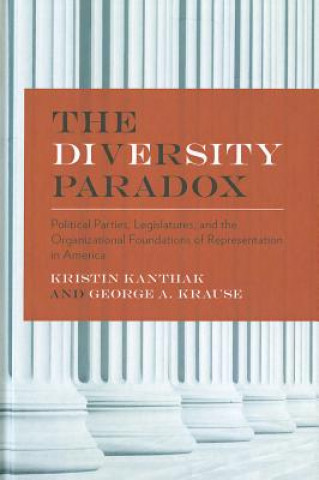
Livraison
Guide d'achat
16 126 809 livres à l’intérieur 175 langues






Afficher toutes les langues (175)
2 047 052 livres numériques à l’intérieur 101 langues






Afficher toutes les langues (101)





Cela ne vous convient pas ? Aucun souci à se faire ! Vous pouvez renvoyer le produit dans les 30 jours
 Bon d’achat
n'importe quelle valeur
Bon d’achat
n'importe quelle valeur
Impossible de faire fausse route avec un bon d’achat. Le destinataire du cadeau peut choisir ce qu'il veut parmi notre sélection.
Diversity Paradox
 Anglais
Anglais
 414 b
414 b
 common.delivery_to
common.delivery_to
Politique de retour sous 30 jours
Ceci pourrait également vous intéresser


Majority-minority group relations are central to the proper functioning of any organization, but these relationships are especially important in democratically-elected legislatures. In legislatures, for example, group dynamics affect how the legislature operates, who is valued enough to play a critical decision-making role, and what voices matter in determining policy outcomes. In The Diversity Paradox, George Krause and Kristin Kanthak explore the nature of these relationships, particularly their effect on both the valuation of minority group legislators and the ideological stability of the legislature in general. Interestingly, they demonstrate that an increase in a minority group's size within a legislature actually leads to the devaluation of individual minority group members. They call this the 'diversity paradox': In fact, representative institutions such as legislatures face a 'diversity paradox': when the size of a minority group increases beyond mere 'tokenism' in representative institutions such as legislatures, it tends to create an unintended backlash toward the minority group's members that emanates from both majority and fellow minority group members. Representative institutions, therefore, can only fulfill the promise of adequate representation of minority group interests only by conquering this paradox. They can accomplish this through jointly attaining sufficient 'numbers' and overcoming the coordination problems those numbers create. This is no small task and no small issue: the inclusion of minority group voices in representative institutions is critical in a wide range of political decisions, ranging from legislative gender quotas in the new Iraqi constitution to attempts in the U.S. to increase minority representation through redistricting. The question of whether or not an increase in descriptive representation (numbers) has an impact on substantive representation (policy) is central to such efforts, and therefore The Diversity Paradox has important ramifications for all students interested in democratic representation.
À propos du livre
 Anglais
Anglais


 Contact
Contact Comment faire ses achats
Comment faire ses achats
















